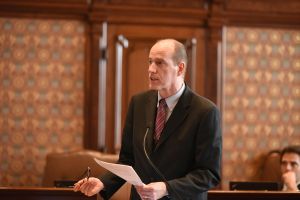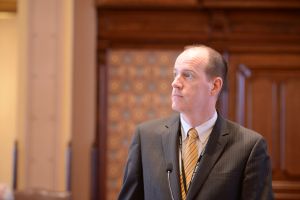Cunningham: Time to deliver fair education funding
- Details
- Category: Press Releases

“I was proud to stand in support of Senate Bill 1, a measure that will fix the worst funding formula in our country. We needed a real solution that not only properly funded our schools but also delivered property tax relief to high-tax districts—and we have done that with this legislation,” said State Senator Bill Cunningham.
Senate Bill 1 was vetted by multiple organizations throughout the state. It had the support of superintendents, school boards and teachers. If signed by the governor, it would be the first significant update to the funding formula in more than 20 years.
Earlier this week, the Illinois State Board of Education released estimates for each school district and showed that no school district in the state would see less state funding under Senate Bill 1 when compared to the current funding formula.
It also provided extra support for those in need and offered additional property tax relief.
The estimated overall gain that area school districts would experience under Senate Bill 1 based on the current-year funding levels:
- Chicago Ridge School District 127-5 -- $880,000
- Community High School District 218 -- $409,448
- Cons High School District 230 -- $209,950
- North Palos School District 117 -- $315,924
- Oak Lawn Community HS District 229 -- $135,174
- Oak Lawn-Hometown School District 123 -- $146,644
- Worth School District 127 -- $193,129
In addition, Senate Bill 1, high-tax school districts would be eligible for property tax relief up to 1 percent of their EAV. Estimated relief for five area school districts:
- Chicago Ridge School District 127-5 -- $573,844
- Community High School District 218 -- $6.62 million
- North Palos School District 117-- $4.01 million
- Oak Lawn Community HS District 229 -- $2.51 million
- Worth School District 127 -- $1.11 million
Senator Cunningham represents portions of Worth, Orland and Palos Townships in the southwest suburbs and the neighborhoods of Mt. Greenwood, Beverly, Morgan Park and Auburn-Gresham in Chicago.
Cunningham closes conflict of interest loophole
- Details
- Category: Press Releases
 SPRINGFIELD – A bipartisan measure to close a conflict of interest loophole in Illinois state law passed the Illinois Senate on Tuesday.
SPRINGFIELD – A bipartisan measure to close a conflict of interest loophole in Illinois state law passed the Illinois Senate on Tuesday.
“No one should be exempt from good government,” said State Senator Bill Cunningham (D-Chicago). “This will close a loophole that could have caused severe conflicts of interest.”
The bipartisan measure, House Bill 2439, would not allow members of the Illinois Energy Conservation Advisory Council to receive any state grants for teaching continuing education regarding any rule proposed by the council.
“It is unethical to receive state funds to teach about rules you are creating,” Cunningham said. “Illinois needs to continue to close these loopholes and today we took a strong step towards doing that.”
The measure now moves to the governor’s desk for his signature.
Cunningham statement on property tax freeze votes
- Details
- Category: Latest
 SPRINGFIELD – State Senator Bill Cunningham (D-Chicago) had the following statement after votes being taken on a property tax freeze.
SPRINGFIELD – State Senator Bill Cunningham (D-Chicago) had the following statement after votes being taken on a property tax freeze.
“The Illinois Senate has voted to deliver much needed property tax relief to homeowners throughout the state,” Cunningham said. “This is another step the Senate has taken to make a serious attempt to end the impasse by passing a balanced budget and significant reforms that protect working families.”
Cunningham: Time to provide necessary resources to handle mental health issues
- Details
- Category: Press Releases
 SPRINGFIELD – Custody of defendants with mental health issues could become more streamlined and appropriate due to legislation that passed the Illinois Senate on Monday.
SPRINGFIELD – Custody of defendants with mental health issues could become more streamlined and appropriate due to legislation that passed the Illinois Senate on Monday.
“We need to provide the necessary resources to ensure the mental health of those determined to be unfit to stand trial or not guilty by reason of insanity be dealt with appropriately,” said State Senator Bill Cunningham (D-Chicago). “It will only help to keep our communities safer in the long run.”
The legislation, House Bill 649, would create a formal process for the county sheriff and the Department of Human Services to handle custody of defendants found unfit to stand trial or not guilty by reason of insanity. It provides requirements regarding the evaluation and transportation of the defendant to a secure facility.
The legislation now moves to the governor’s desk for approval.
More Articles …
Page 89 of 110




